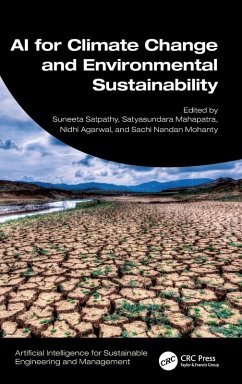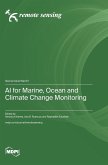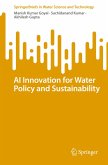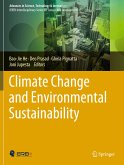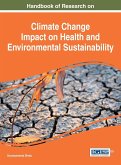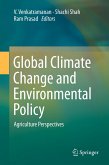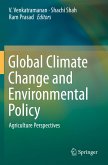AI for Climate Change and Environmental Sustainability
Herausgeber: Satpathy, Suneeta; Agarwal, Nidhi; Mahapatra, Satyasundara
AI for Climate Change and Environmental Sustainability
Herausgeber: Satpathy, Suneeta; Agarwal, Nidhi; Mahapatra, Satyasundara
- Gebundenes Buch
- Merkliste
- Auf die Merkliste
- Bewerten Bewerten
- Teilen
- Produkt teilen
- Produkterinnerung
- Produkterinnerung
This book discusses the adverse effects of climatic changes on our planet. It examines AI-based tools and technologies and how they can assist in identifying energy emission reductions, CO2 removal, and support the development of greener transportation networks, monitoring deforestation, and forecast extreme weather events.
Andere Kunden interessierten sich auch für
![AI for Marine, Ocean and Climate Change Monitoring AI for Marine, Ocean and Climate Change Monitoring]() AI for Marine, Ocean and Climate Change Monitoring93,99 €
AI for Marine, Ocean and Climate Change Monitoring93,99 €![AI Innovation for Water Policy and Sustainability AI Innovation for Water Policy and Sustainability]() Manish Kumar GoyalAI Innovation for Water Policy and Sustainability38,99 €
Manish Kumar GoyalAI Innovation for Water Policy and Sustainability38,99 €![Climate Change and Environmental Sustainability Climate Change and Environmental Sustainability]() Climate Change and Environmental Sustainability171,99 €
Climate Change and Environmental Sustainability171,99 €![Handbook of Research on Climate Change Impact on Health and Environmental Sustainability Handbook of Research on Climate Change Impact on Health and Environmental Sustainability]() Handbook of Research on Climate Change Impact on Health and Environmental Sustainability338,99 €
Handbook of Research on Climate Change Impact on Health and Environmental Sustainability338,99 €![Global Climate Change and Environmental Policy Global Climate Change and Environmental Policy]() Global Climate Change and Environmental Policy127,99 €
Global Climate Change and Environmental Policy127,99 €![Global Climate Change and Environmental Policy Global Climate Change and Environmental Policy]() Global Climate Change and Environmental Policy127,99 €
Global Climate Change and Environmental Policy127,99 €![Climate Change Alleviation for Sustainable Progression Climate Change Alleviation for Sustainable Progression]() Climate Change Alleviation for Sustainable Progression232,99 €
Climate Change Alleviation for Sustainable Progression232,99 €-
-
-
This book discusses the adverse effects of climatic changes on our planet. It examines AI-based tools and technologies and how they can assist in identifying energy emission reductions, CO2 removal, and support the development of greener transportation networks, monitoring deforestation, and forecast extreme weather events.
Hinweis: Dieser Artikel kann nur an eine deutsche Lieferadresse ausgeliefert werden.
Hinweis: Dieser Artikel kann nur an eine deutsche Lieferadresse ausgeliefert werden.
Produktdetails
- Produktdetails
- Verlag: CRC Press
- Seitenzahl: 180
- Erscheinungstermin: 14. August 2024
- Englisch
- Abmessung: 240mm x 161mm x 14mm
- Gewicht: 440g
- ISBN-13: 9781032589060
- ISBN-10: 103258906X
- Artikelnr.: 70151833
- Herstellerkennzeichnung
- Libri GmbH
- Europaallee 1
- 36244 Bad Hersfeld
- gpsr@libri.de
- Verlag: CRC Press
- Seitenzahl: 180
- Erscheinungstermin: 14. August 2024
- Englisch
- Abmessung: 240mm x 161mm x 14mm
- Gewicht: 440g
- ISBN-13: 9781032589060
- ISBN-10: 103258906X
- Artikelnr.: 70151833
- Herstellerkennzeichnung
- Libri GmbH
- Europaallee 1
- 36244 Bad Hersfeld
- gpsr@libri.de
Dr Suneeta Satpathy (Senior member, IEEE) is currently working as an associate professor, Center for AI & ML, SoA University, Bhubaneswar, Odisha. She received her Ph.D. from Utkal University, Bhubaneswar, Odisha, in 2015, with a Directorate of Forensic Sciences, MHA scholarship from the Government of India. Her research interests include Computer Forensics, Cyber Security, Data Fusion, Data Mining, Big Data Analysis, and Decision Mining. She has edited books in association with Springer and Wiley and CRC AAP, NOVA Publications. In addition to research, she has guided many post-graduate and graduate students. She has published papers in many international journals and reputable conferences. Her professional activities include roles as an editorial board member and/or reviewer of Journal of Engineering Science, Advancement of Computer Technology and Applications, Robotics and Autonomous Systems (Elsevier), Computational and Structural Biotechnology Journal (Elsevier), Journal of Big Data (Springer) as well as Inder Science Journals. She is an active member of CSI, ISTE, OITS, IE, Nikhil Bharat Shiksha Parisad and IEEE. Dr Satyasundara Mahapatra is working as a professor in the department of Computer Science and Engineering, Pranveer Singh Institute of Technology, Kanpur, Uttar Pradesh. He received his Ph.D. and master's degree in computer science from Utkal University, Bhubaneswar, Odisha in 2006 and 2016, respectively. He also holds an MCA degree from Utkal University, Bhubaneswar, Odisha in 1997. His current research interests include Machine Learning, Deep Learning, Image Processing, Scheduling with Optimization, and Internet of Things. He has a number of publications as authored or co-authored in various international scientific journals, book chapters and five patent approvals and two patent grants in his field of expertise. He was also selected for the award of grant under "Visvesvaraya Research Promotion Scheme" for academic year 2019-2020 for his research project. Ms Nidhi Agarwal is a computer science and engineering faculty member with 19+ years of experience, an author of many papers in SCI/SCI-E indexed journals, SCOPUS-indexed journals and conferences, books and book chapters, patents, strong subject knowledge, reviewer and editorial board member of many international journals including SCI/E, SCOPUS, session chair in many SCOPUS-indexed international conferences, and NTA NET qualified in Computer Science and Applications. She was a National Merit Scholarship Holder for outstanding performance in mathematics in class 10. She received a Research Excellence award of Rs 1 lakh in 2023 for excellence in research in 2022 from IGDTUW, Delhi. She received the CV Raman Award at KIET Group of Institutions in 2022 for being the best researcher at the institute level for the academic session 2021-22. She also received the "Shikshak Samman Award 2022" by Nikhil Bharat Shiksha Parishad, Govt. of India, for outstanding work in research. Dr. Sachi Nandan Mohanty was recognized as Top 2% World Scientists Ranking by Stanford University and Elsevier for the year 2023. He received his PostDoc from Indian Institute of Technology Kanpur, India, in the year 2019 and Ph.D. from Indian Institute of Technology Kharagpur, India, in the year 2015, with MHRD scholarship from Govt of India. He has authored/edited 42 books, published by IEEE-Wiley, Springer, Wiley, CRC Press, NOVA, and De Gruyter. His research areas include Data mining, Big Data Analysis, Cognitive Science, Fuzzy Decision Making, Brain-Computer Interface, Cognition, and Computational Intelligence. Prof. S N Mohanty has received four Best Paper Awards during his Ph.D. from International Conference at Beijing, China, and the other at International Conference on Soft Computing Applications organized by IIT Roorkee in the year 2013. He was awarded the Best thesis award first prize by Computer Society of India in the year 2015. He has guided nine PhD Scholars, 23 postgraduate students. He has published 241 International Journals of International repute. He has received fourth time International Travel support from Government of India's Department of Science and Technology, SERB Funding for International travel for presenting research paper, and Keynote specker. He has been awarded by many awards and fellowship during his career and to name a few are Prof. Ganesh Mishra Memorial Award on 61st Annual Technical Session & 19th Prof. Bhubaneswar Behera Lecturer on 23-24 June 2020 from The Institution of Engineers (India) Odisha State Center, Bhubaneswar. He is a member of professional bodies like IETE, CSI, IE, IEEE (Hyderabad section). He is also the reviewer of Journal of Robotics and Autonomous Systems (Elsevier), Computational and Structural Biotechnology Journal (Elsevier), Artificial Intelligence Review (Springer), Spatial Information Research (Springer). He is leading as General chair of two international conferences such as ICISML, AIHC and editor in chief of International Journal EAI Transaction on Intelligent System and Machine learning Application. Dr. Mohanty has gone for academic assignment to New York, Atlanta, Orlando, Georgia, Paris, Slovakia, Singapore, Abu Dhabi, Sharjah, Dubai, Malaysia, Istanbul, Vienna, and Germany for delivering Keynote talk and chair the sessions in international conferences with travel support from Department of Science and Technology, Government of India, New Delhi, India.
Chapter 1- AI For Sustainable and Eco-Friendly Environment For Climate
Change
Chapter 2- Enhancing Climate Change Prediction and Risk Assessment with
Deep Learning: Architectural Approaches and Data Challenges
Chapter 3- AI- and IoT-Based Application for Rainfall Prediction: A Study
Chapter 4- Machine-Learning Based Prediction of Wind Speed for Ratnagiri
Region, India
Chapter 5- Wind Power Forecasting with Machine Learning Approach
Chapter 6- IOT Communication Technologies
Chapter 7- Machine Learning Models for Intelligent Hazard Management
Chapter 8- Optimal Dispatch of Distributed Renewable Energy Sources in
Isolated Microgrid System Exploiting Metaheuristic Optimization Algorithms
Chapter 9- Leveraging Machine Learning Models for Intelligent Hazard
Management
Chapter 10- Practical and Innovative Applications of IOT and IOT Networks
(Smart Cities, Smart Mobility, Smart Home, Smart Health, Smart Grid, etc.)
Chapter 11- Leveraging Artificial Intelligence in Climate Change
Interpretation: Overcoming Challenges in Risk Management Approach
Change
Chapter 2- Enhancing Climate Change Prediction and Risk Assessment with
Deep Learning: Architectural Approaches and Data Challenges
Chapter 3- AI- and IoT-Based Application for Rainfall Prediction: A Study
Chapter 4- Machine-Learning Based Prediction of Wind Speed for Ratnagiri
Region, India
Chapter 5- Wind Power Forecasting with Machine Learning Approach
Chapter 6- IOT Communication Technologies
Chapter 7- Machine Learning Models for Intelligent Hazard Management
Chapter 8- Optimal Dispatch of Distributed Renewable Energy Sources in
Isolated Microgrid System Exploiting Metaheuristic Optimization Algorithms
Chapter 9- Leveraging Machine Learning Models for Intelligent Hazard
Management
Chapter 10- Practical and Innovative Applications of IOT and IOT Networks
(Smart Cities, Smart Mobility, Smart Home, Smart Health, Smart Grid, etc.)
Chapter 11- Leveraging Artificial Intelligence in Climate Change
Interpretation: Overcoming Challenges in Risk Management Approach
Chapter 1- AI For Sustainable and Eco-Friendly Environment For Climate
Change
Chapter 2- Enhancing Climate Change Prediction and Risk Assessment with
Deep Learning: Architectural Approaches and Data Challenges
Chapter 3- AI- and IoT-Based Application for Rainfall Prediction: A Study
Chapter 4- Machine-Learning Based Prediction of Wind Speed for Ratnagiri
Region, India
Chapter 5- Wind Power Forecasting with Machine Learning Approach
Chapter 6- IOT Communication Technologies
Chapter 7- Machine Learning Models for Intelligent Hazard Management
Chapter 8- Optimal Dispatch of Distributed Renewable Energy Sources in
Isolated Microgrid System Exploiting Metaheuristic Optimization Algorithms
Chapter 9- Leveraging Machine Learning Models for Intelligent Hazard
Management
Chapter 10- Practical and Innovative Applications of IOT and IOT Networks
(Smart Cities, Smart Mobility, Smart Home, Smart Health, Smart Grid, etc.)
Chapter 11- Leveraging Artificial Intelligence in Climate Change
Interpretation: Overcoming Challenges in Risk Management Approach
Change
Chapter 2- Enhancing Climate Change Prediction and Risk Assessment with
Deep Learning: Architectural Approaches and Data Challenges
Chapter 3- AI- and IoT-Based Application for Rainfall Prediction: A Study
Chapter 4- Machine-Learning Based Prediction of Wind Speed for Ratnagiri
Region, India
Chapter 5- Wind Power Forecasting with Machine Learning Approach
Chapter 6- IOT Communication Technologies
Chapter 7- Machine Learning Models for Intelligent Hazard Management
Chapter 8- Optimal Dispatch of Distributed Renewable Energy Sources in
Isolated Microgrid System Exploiting Metaheuristic Optimization Algorithms
Chapter 9- Leveraging Machine Learning Models for Intelligent Hazard
Management
Chapter 10- Practical and Innovative Applications of IOT and IOT Networks
(Smart Cities, Smart Mobility, Smart Home, Smart Health, Smart Grid, etc.)
Chapter 11- Leveraging Artificial Intelligence in Climate Change
Interpretation: Overcoming Challenges in Risk Management Approach

